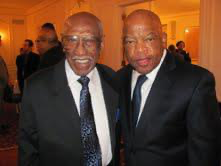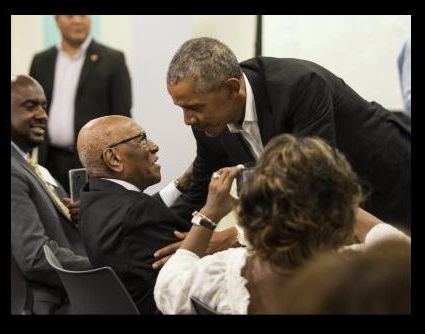It was 103 years ago that Timuel D. Black, Jr. was born in Birmingham, AL. It was December 7, 1918. The significance of that birth date cannot be overlooked or understated. It is, perhaps, one of the most significant dates in present history in that it brought forth an individual who was a true renaissance man. Overcoming insurmountable adversity in both his private and public lives, reaching achievements that most people can only dream of accomplishing, Black traversed the world, met kings and queens, served his country, was honored by foreign friends, wrote books, taught some of today’s formidable leaders, organized and marched with Dr. Martin Luther King, Jr. and others, and worked and fought to help shape the modern civil rights struggle in the U. S.
 In his Bronzeville neighborhood, he is known as Baba (a term used in many of the African languages in southern Africa, with a connotation of respect attached to a highly valued social role and age), and Griot (a West African oral historian). Always positive, teller of tales, fighter of the good fight, protector of our history. To many he is a cultural icon, a larger than life figure whose legacy encompasses more than 90 decades. His life’s journey has been one of serving country, building family, securing civil rights and supporting community. It is, therefore, apropos that the members of the Illinois Legislative Black Caucus through the Illinois House of Representatives issued a House Resolution to recognize Timuel “Tim” D. Black, Jr., for his accomplishments and especially for his local and national work in the civil rights movement. It is fitting to honor him for a lifetime of unparalleled service to the community as an educator, soldier, political activist, lecturer, civil rights leader, author and social historian.
In his Bronzeville neighborhood, he is known as Baba (a term used in many of the African languages in southern Africa, with a connotation of respect attached to a highly valued social role and age), and Griot (a West African oral historian). Always positive, teller of tales, fighter of the good fight, protector of our history. To many he is a cultural icon, a larger than life figure whose legacy encompasses more than 90 decades. His life’s journey has been one of serving country, building family, securing civil rights and supporting community. It is, therefore, apropos that the members of the Illinois Legislative Black Caucus through the Illinois House of Representatives issued a House Resolution to recognize Timuel “Tim” D. Black, Jr., for his accomplishments and especially for his local and national work in the civil rights movement. It is fitting to honor him for a lifetime of unparalleled service to the community as an educator, soldier, political activist, lecturer, civil rights leader, author and social historian.
Timuel D. Black created milestones and lived history. His Family was part of the first Great Migration of African Americans who left the south and came to Chicago in 1919. During his formative years, he attended public schools, Edmund Burke Elementary and DuSable High. He worked as a newspaper boy for the Chicago Defender and was a delivery boy for a local grocery store during the Great Depression. Activism bubbled up in his blood, as he became more involved in civil rights work. Timuel Black served as the Chicago chair of the historic 1963 March on Washington; organized the “Don’t Spend Your Money Where You Can’t Work” campaign, which led to the formation of the Negro Retail Clerks Union. He helped organize the Congress on Racial Equality (CORE), which worked to desegregate Chicago department stores and public accommodations; challenged the “Regular Democratic Organization” and coined the phrase “Plantation Politics”; and in 2008, was the lead plaintiff in Black v. McGuffage, a lawsuit that charged the Illinois voting system with systemic discrimination against minorities.
 Black served in the U.S. Army during World War II and was awarded four battle stars and a Croix de Guerre (the highest military honor accorded by France to non-citizens). Returning to Chicago, he enrolled at Roosevelt University where he received his bachelor’s degree and later earned a master’s degree from the University of Chicago. In 2008 he received an honorary doctoral degree from his alma mater, Roosevelt University. In 2010 and again in 2015, he traveled to the Netherlands and The Hague to be honored and lecture at the annual Dr. Martin Luther King, Jr. Day Dinner of the United States Embassy; and in 2012 became the first African American recipient of the University of Chicago’s William Benton Medal for Distinguished Public Service. In 2013, the City of Chicago honored Black with the inaugural Chicago Champion of Freedom Award, in recognition of his work in the civil rights movement both locally and nationally.
Black served in the U.S. Army during World War II and was awarded four battle stars and a Croix de Guerre (the highest military honor accorded by France to non-citizens). Returning to Chicago, he enrolled at Roosevelt University where he received his bachelor’s degree and later earned a master’s degree from the University of Chicago. In 2008 he received an honorary doctoral degree from his alma mater, Roosevelt University. In 2010 and again in 2015, he traveled to the Netherlands and The Hague to be honored and lecture at the annual Dr. Martin Luther King, Jr. Day Dinner of the United States Embassy; and in 2012 became the first African American recipient of the University of Chicago’s William Benton Medal for Distinguished Public Service. In 2013, the City of Chicago honored Black with the inaugural Chicago Champion of Freedom Award, in recognition of his work in the civil rights movement both locally and nationally.
During the gala celebration of his 100th birthday on December 9, 2018, he was awarded the French Legion of Honor medal by the French Consul General of Chicago. Additionally, He has authored two of a three-book series chronicling the “great migration” and the history of Chicago from the 1920s to the present. His memoir, Sacred Ground, was published in 2019 by Northwestern University Press. Black ran for public office several times and spent his life furthering the cause of social justice. He is a pioneer in the independent black political movement and assisted, advised and supported political leaders including Dr. Martin Luther King, Harold Washington, and former U. S. President Barack Obama.
His life’s contributions and African American history are being preserved for others to experience. In January of 2012, the Timuel D. Black Jr. Archive was officially inaugurated and opened to researchers; the massive archive of Timuel Black documents, letters, books, recordings, news clips and videos and memorabilia is housed in the Vivian Harsh Collection at the Carter G. Woodson Regional Library in Chicago; A non-profit 501(c)(3) charitable corporation, the Vivian G. Harsh Society, Inc. was established to help preserve the legacy of African-American history for future generations. Additionally, Tim was the inaugural honoree of the Illinois Black Hall of Fame (IBHOF) in Chicago (https://gsunews.govst.edu/illinois-black-hall-of-fame-launches-at-governors-state-university/), and the University of Chicago’s Civic Knowledge Project has established The Timuel D. Black Community Solidarity Scholar (https://civicknowledge.uchicago.edu/solidarity-scholar-fund.shtml) in his name.
To those who worked with him in the trenches of struggle; who marched, protested and campaigned; and who shared passionate debates with him in his life, in his work, in his writings, Tim remains the tireless standard bearer for equality, social and economic justice and empowerment. He will be presented a copy of the resolution by the House of Representatives of The One Hundred Second General Assembly of The State of Illinois to recognize these lifelong accomplishments. We can only try to emulate him and touch the coat tails of this “movement” of a man.